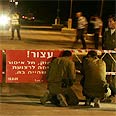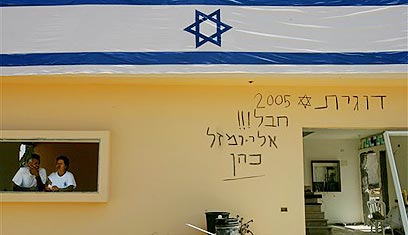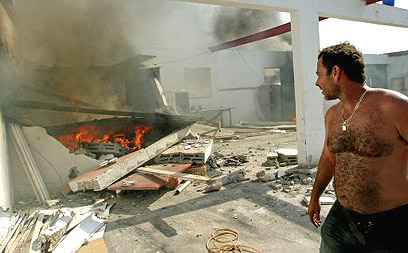
Gaza sealed off; pullout under way
Gaza’s Kissufim crossing sealed off at midnight, signs in Hebrew and English warn against entering Strip; pullout expected to start with ‘easy-to-evacuate’ communities. Evacuation operation to get under way at 7 a.m. Monday. About 25,000 soldiers, police officers ready for action
Signs in Hebrew and English pasted to the roadblock inform visitors that they are banned from entering or staying in Gaza.
Meanwhile, all crossing points into Gaza were also sealed off. The Karni-Netzarim road, which leads to the central Gaza settlement of Netzarim was closed to traffic. In the next two days, Gaza residents would be able to leave the Strip with their cars, but as of Wednesday they would no longer be allowed to depart independently.
Police and IDF forces are preparing at this time to arrive at settlers’ homes starting at 7 a.m. Monday, knock on residents’ doors, and inform them they have 48 hours to leave their houses. Should the evacuees refuse to leave voluntarily, forces will remove them by force starting Wednesday.
At this time it appears the pullout will start with communities characterized as easy to evacuate and will gradually move on to more difficult settlements.
Meanwhile, security sources told Ynet officials will make the final decision regarding the evacuation sequence without government approval. The matter was reportedly finalized in a meeting between Prime Minister Ariel Sharon, Defense Minister Shaul Mofaz, and senior security officials.
Kissufim crossing at midnight (Video: Hanan Greenberg)
Meanwhile, hundreds of residents who are unwilling to experience the evacuation firsthand continue to stream out of Gush Katif.
5,000 infiltrators
According to official assessments, about 5,000 infiltrators are currently inside the Gaza Strip and are expected to constitute the hardcore resistance to the withdrawal. However, Army Chief Dan Halutz estimated that the infiltrators’ presence would not delay the evacuation.
Southern District Police Commander Uri Bar-Lev and IDF Southern Command Head Dan Harel briefed their forces Sunday, ahead of the evacuation operation. At about 3 a.m., dozens of buses carrying teams of officers will head to Gush Katif.
Meanwhile, the military decree declaring the northern West Bank a closed military zone will also go into effect at midnight, after IDF Central Command Head Yair Naveh signed the order. There too, forces will arrive at residents’ homes and inform them they must leave within 48 hours.
Dugit settlers waiting for the movers (Photo: AP)

On Monday morning the government is schedule to approve the evacuation of 21 more settlements, and Tuesday the government is expected to decide on which settlements would be evacuated first.
According to security establishment estimates, two settlements will be evacuated daily, meaning the entire pullout will be completed in about two-and-a-half weeks, with the target date being September 4.
No flowers for evacuating troops
Some 25,000 IDF soldiers and Israel Police and Border Guard officers are participating in pullout-related tasks. On Sunday security forces placed roadblocks along central traffic arteries in the western Negev and southern coastal plain regions to prevent pullout objectors from making their way to Gush Katif.
Meanwhile, hundreds of Gush Katif settlers have left the area via the Kissufim roadblock; many hauled their belongings on pick-up trucks, and some Rafah Yam settlers even dragged their boats out of Gush Katif.
Peat Sadeh resident Yaakov Mizeltren burns down his home

Some Peat Sadeh settlers preferred to burn their furniture, while others detached windows and sun-heated water tanks to prepare their homes for their imminent demolition.
“For every 20 people that leave (Gush Katif), one person enters with food or equipment,” a police official told Ynet.
“While the Gaza exodus has not begun, the phenomenon (people leaving) is worth noting.”
Many Gush Katif settlers were seen trying to sell old equipment to Palestinians residing in the Muasi area, near the settlement of Shirat Hayam.
The number of people infiltrating Gush Katif has decreased significantly, but dozens of teenagers were waiting for rides in hitchhiking stops on the way to Gaza.
Shirat Hayam settlers called a press conference to announce they would not resort to violence during the evacuation, but added that the hundreds residing in illegal tent encampments do not plan on leaving willingly.
“The soldiers will not be greeted with flowers here, but we will not confront them,” Shirat Hayam Secretary Yossi Hazut said.
“This is true, of course, in the event the police officers themselves will not resort to violence.”
Many settlers spent the day in synagogues for Tisha Be'av prayer sessions, which included lamentations on “the expulsion of Gush Katif and West Bank Jews.”
-Ronny Sofer, Hanan Greenberg, and Efrat Weiss contributed to the story










